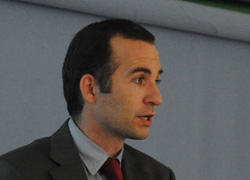IMDEA Networks

Event Category: In-house Presentation
Characterizing the Behavior of Content Publishers in BitTorrent
Due to the increasing popularity of P2P systems and their contribution to overall Internet traffic, it is essential to understand how content, which is the main attraction in P2P systems, is fed. The main goal of this talk is to identify and characterize those communities of users that are primarily responsible for publishing/feeding content in BitTorrent. For this purpose we have performed two large scale measurement studies that collectively identify the feeders of more than 30k torrents. Out of these measurements we conclude that a significant part of the BitTorrent’s content (40%) is fed by two different groups: (i) users concentrated min a few IP addresses of Hosting Service Providers. In particular, there is a single Hosting Provider in this community that alone is responsible of feeding 25% of the content published in the current major BitTorrent Portal. (ii) A large number of regular BitTorrent users spread across the networks of big ISPs. In addition, we characterize how the feeders of both communities behave, finding out that the typical Hosting Providers feeder (i) publishes a larger number of torrents that become more popular and (ii) seeds longer its torrents than regular users acting as feeders. Our findings suggest that a small group of users in Hosting Providers effectively leverage BitTorrent to publish content. Therefore, their presence is essential for the livelihood of BitTorrent.
Read more arrow_right_altEnergy Efficient Wireless Internet Access with Cooperative Cellular Networks
Marco Ajmone Marsan holds a double appointment as Chief Researcher at IMDEA Networks (Spain) and Full Professor at the Department of Electronics (Dipartimento di Elettronica) of the Politecnico di Torino (Polytechnic University of Turin) (Italy). He is the founder of the Telecommunication Networks Group, one of the top research groups in networking in Europe, based at the Politecnico di Torino.
Read more arrow_right_altAn analytical model for a Cache Assisted IPv6 Address Autoconfiguration protocol for VANETs
Vehicular communications will increase road safety, traffic efficiency and driving comfort, by enabling vehicles to form Vehicular Ad-hoc Networks (VANETs) and to directly exchange information. Additionally, connecting the VANET to an IP based network infrastructure (e.g., the Internet) may enhance those applications, and creating the opportunity for others such as infotainment ones (e.g., games, web browsing, e-mail, etc.). One of the functionalities needed to bring IP to vehicular networks is the capability of vehicles to autoconfigure an IPv6 address. GeoSAC is a mechanism enabling IPv6 address autoconfiguration in vehicular networks based on geographic routing. In GeoSAC, as a result of the mobility of the vehicles, they cannot always use the same IP address. Each new address configuration introduces a delay during which communications are interrupted. We propose an improvement for GeoSAC, based on the caching of Router Advertisements, to avoid this disruption time. We also analytically model the probability of achieving seamless IP address reconfiguration as well as an expression for the average configuration time of nodes. The model is validated through extensive simulation. Results in different realistic scenarios show that the use of our proposed optimisation is valuable and would improve the performance in terms of configuration time and/or signaling overhead and the average configuration time expression would provide network administrators with a powerful tool that can be used during the network design.
Read more arrow_right_altA Control Theoretic Approach to Distributed Optimal Configuration of 802.11 WLANs
The optimal configuration of the contention parameters of a WLAN depends on the network conditions in terms of number of stations and the traffic they generate. Following this observation, a considerable effort in the literature has been devoted to the design of distributed algorithms that optimally configure the WLAN parameters based on current conditions. In this work we propose a novel algorithm that, in contrast to previous proposals which are mostly based on heuristics, is sustained by mathematical foundations from multivariable control theory. A key advantage of the algorithm over existing approaches is that it is compliant with the 802.11 standard and can be implemented with current wireless cards without introducing any changes into the hardware or firmware. We study the performance of our proposal by means of theoretical analysis, simulations and a real implementation. Results show that the algorithm substantially outperforms previous approaches in terms of throughput and delay.
Read more arrow_right_altWhen the network follows the mobile: extensions to Proxy Mobile IPv6
Users' demands for Internet connectivity anytime anywhere are no longer a future requirement, but a reality that operators face today. The current trend in hand-held devices, equipped with multiple access technologies, and accessing IP data services triggered the need for mobility support managed by the IP layer. However, the complexity of protocols such as Mobile IP complicated the deployment of solutions in real products. Lately, there is a new trend toward solutions that enable the mobility of IP devices with a local domain with only the support from the network. Proxy Mobile IPv6 is the solution standardized by the IETF that follows this "novel" approach.
Read more arrow_right_altImpact of Prefix Hijacking on Payments of Providers
Whereas prefix hijacking is usually examined from security perspectives, this paper looks at it from a novel economic angle. Our study stems from an observation that a transit AS (Autonomous System) has a financial interest in attracting extra traffic to the links with its customers. Based on real data about the actual hijacking incident in the Internet, we conduct simulations in the real AS-level Internet topology with synthetic demands for the hijacked traffic. Then, we measure traffic on all inter-AS links and compute the payments of all providers. The analysis of our results from technical, business, and legal viewpoints suggests that hijacking-based traffic attraction is a viable strategy that can create a fertile ground for tussles between providers. In particular, giant top-tier providers appear to have the strongest financial incentives to hijack popular prefixes and then deliver the intercepted traffic to the proper destinations. We also discuss directions for future research in the area of hijacking-based traffic attraction.
Read more arrow_right_altI-seismograph: Observing and Measuring Internet Earthquakes
Disruptive events such as large-scale power outages, undersea cable cuts, or Internet worms could cause the Internet to deviate from its normal state of operation. This deviation from normalcy is what we call the impact on the Internet, which we also refer to as an "Internet earthquake."
Read more arrow_right_alt
Is Content Publishing in BitTorrent Altruistic or Profit-Driven?
BitTorrent is the most popular P2P content delivery appli-cation where individual users share various type of content with tens of thousands of other users. The growing popular-ity of BitTorrent is primarily due to the availability of valuable content without any cost for the consumers. However, apart from required resources, publishing (sharing) valuable (and often copyrighted) content has serious legal implica-tions for users who publish the material (or publishers). This raises a question that whether (at least major) content publishers behave in an altruistic fashion or have other incentives such as financial. In this study, we identify the content publishers of more than 55K torrents in two major BitTorrent portals and examine their behavior. We demonstrate that a small fraction of publishers is responsible for 67% of the published content and 75% of the downloads. Our investigations reveal that these major publishers respond to two dif-ferent profiles. On the one hand, antipiracy agencies and ma-licious publishers publish a large amount of fake files to protect copyrighted content and spread malware respectively. On the other hand, content publishing in BitTorrent is largely driven by companies with financial incentives. Therefore, if these companies lose their interest or are unable to publish content, BitTorrent traffic/portals may disappear or at least their associated traffic will be significantly reduced.
Read more arrow_right_altVivisecting the YouTube Video Delivery Cloud: Overall Architecture and Key Mechanisms
Since its inception in 2005, YouTube has seen explosive growth in its popularity; today it is indisputably the world’s largest video sharing site. Given the number of viewers and the accompanying traffic volume, its geographical span and scale of operations, the design of YouTube’s content delivery infrastructure is a highly challenging engineering task.
Read more arrow_right_altContent-Centric Networking: challenges and (possible) solutions
Content-Centric Networking (CCN) is a clean-slate proposal to replace/enrich the current Internet. CCN is focused on content instead of machines, so users can request a given content by sending Interest messages with the name of the content. CCN routers have three main data structures: a FIB mapping content names to outbound faces, a Content Store to cache data packets and a pending Interest table (PIT) to forward incoming packets towards the consumers, using a breadcrumb mechanism. Security is part of the proposal, as all data packets are signed by its publisher.
Read more arrow_right_alt











Recent Comments